This section is for paid subscribers only. Our subscription is only $3700/- for one full year.
You get unlimited access to all paid section and features on the website with this subscription.
Subscribe to read full article
This section is for paid subscribers only. Our subscription is only $37/- for one full year.
You get unlimited access to all paid section and features on the website with this subscription.
Not ready for a full subscription?
You can access this article for $2, and have it saved to your account for one year.
- Release Date1936
- GenreDrama
- FormatB-W
- LanguageTamil
One of the earliest films on a contemporary theme, as distinct from mythological, this film was scripted by S D S Yogi. In addition to other social issues, the film depicted the conditions prevailing in a commercial drama company: one of the two lead characters was a drama buff. (Commercial drama was the most popular form of entertainment in the Thirties.)
The story was about the conflicts and values of the joint family system and revolved around two brothers, Sabapathy and Pasupathy. The problems in the household are aggravated by the wife of the elder brother and a fight for the family property ensues. After a serious of tribulations, the brothers are reconciled and once again come together as a family. A supernatural element is introduced in the form of a family angle (in the garb of a mind servant) who is a trouble-shooter.
The film was shot in Sagar Movietone in Bombay and was directed by an American, who had been trained in Hollywood, Ellis R Dungan. He drastically reduced the number of songs, from the usual thirty-five to a mere thirteen, and laid emphasis on acting. For some sequences, his rehearsals lasted as long as three hours. He encouraged the actors to speak their lines extempore, after briefing them about the scene to be shot and shot more footage than was the practice and edited the film himself. He also integrated the humorous sequences into the film rather than keep them separate as a parallel plot.
The film’s producer Ramasamy, a businessman from Coimbatore, was a Congress party sympathizer and therefore had nationalistic songs inserted in the film. S Satyamurthi was so impressed with it that he wrote a letter of praise to The Hindu. He also persuaded Rajaji, then the prime minister of Madras presidency, to see the film in a special show that Elphinstone Talkies on Mount Road.
[from the book The Eye of the Serpent by S. Theodore Baskaran]

Cast
Crew
-
BannerParameshwar Sound Picture, Coimbatore
-
Director
-
Music Director
-
Lyricist
-
Story Writer
-
Screenplay
-
Art Director/Production Design










.jpg)



